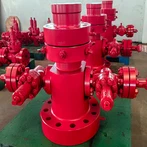In the field of drilling, where extracting valuable resources from beneath the earth's surface is a crucial and intricate task, a drill pipe plays a key role.
A drill pipe is a seamless tube manufactured to endure the rugged and challenging conditions encountered in drilling operations. This seamless design process guarantees longevity, minimizing the risk of weak points that might undermine the pipe's structural integrity. They come in a variety of sizes, strengths, and wall thicknesses.
A drill pipe typically constitutes a large portion, usually around 95%, of what is known as the 'drill string'. Read on for more information on drill strings!
A key characteristic of a drill pipe is its hollow interior. The fact a drill pipe is hollow is essential for drilling because it lets fluid flow through the pipe.
What materials are used in drill pipes?
Drill pipes made out of steel are the most common. The specific steel alloy used is typically high-strength, low-alloy steel (HSLA). This type of steel is chosen for its ability to withstand the harsh conditions encountered during drilling, including high-stress levels, corrosion, and wear.
Aluminum is also occasionally chosen, due to its light-weight characteristic. Aluminum pipes are well-suited for situations where weight is a critical factor, such as remote drilling or when equipment weight limitations need to be considered.
In some cases, drill pipes may be coated with materials like nickel or other anti-corrosion coatings to provide additional protection against corrosion.
Drilling pipe classification
After inspection, drill pipes are categorized into one of three classes:
N-Class (New Pipe): These are the strongest and newest pipes available, typically in excellent or near-pristine condition.
P-Class (Premium Pipe): Premium pipes are a step down from N-Class. They have experienced some wear but are still highly functional.
C-Class (Used Pipe): C-Class pipes further subdivide into C-1, C-2, and C-3, depending on their condition. They range from well-worn pipes to those nearing the end of their serviceable life. The specific rating indicates the extent of wear and longevity, making C-Class pipes suitable for less demanding drilling tasks.
Once a pipe is no longer usable, it gets marked with a red band and assessed for scrap. Drill pipes can be expensive, so they are often reused.
Types of drilling pipes
Drill pipes vary, tailored to specific drilling needs. Common types include regular and heavyweight drill pipes, with spiral pipes for enhanced torque transmission and speciality pipes for directional and horizontal drilling.
Understanding these different types of drilling pipes is essential for selecting the right tools and equipment to optimize drilling efficiency and effectiveness in diverse geological conditions.
Regular drill pipe
A regular drill pipe, or standard drill pipe, comes in various sizes and outer diameters. The most common outside diameter for regular drill pipes ranges from approximately 2 3/8 inches to 6 5/8 inches.
Drilling pipes are typically manufactured in standard lengths, with the most common options being 30 feet (9 meters) and 45 feet (14 meters). Longer lengths may be used for deeper drilling projects.
Many regular drill pipes have a center upset or thick wear pads. These features prevent the outer surface of the drill pipe from grinding against the rough walls of the borehole. Center upsets reduce wear and friction, prolonging the lifespan of the drill pipes.
Heavy weight drill pipe
A heavy weight drill pipe (HWDP) is characterized by its thicker walls and significantly higher weight per foot (lb/ft) compared to regular drill pipes. These attributes make a heavy weight drill pipe exceptionally well-suited for demanding drilling applications.
HWDP is designed to address challenges like borehole control, wellbore stability, and high-pressure environments in deep drilling. Its added weight helps maintain drilling accuracy.
Vigor's drill pipes are produced according to API 5DP standard, we can provide you with API 5DP Grade: E,95(x),105(G),135(5) grades for production, if you are interested in Vigor drill pipes or other downhole drilling tools used in the oil and gas industry, please do not hesitate to contact us.






